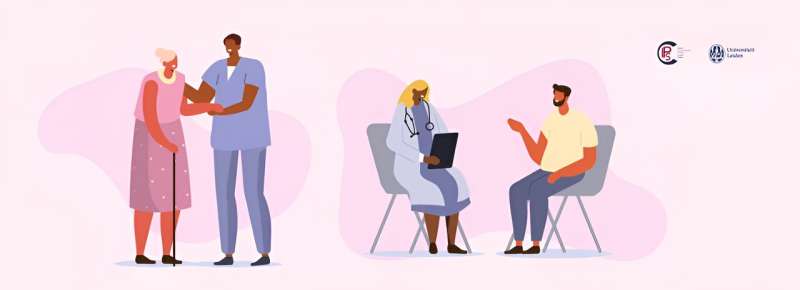This article has been reviewed according to Science X's editorial process and policies. Editors have highlighted the following attributes while ensuring the content's credibility:
fact-checked
peer-reviewed publication
trusted source
proofread
Study explores harmful communication in oncology

Ph.D. student Janine Westendorp and her colleagues conducted literature research on what patients with cancer and their loved ones perceive as harmful communication from health care providers. The results were published in the journal Psycho-Oncology and are released as a poster to distribute to health care providers.
After the words "You have cancer," a period of difficult decisions, intensive treatments, side effects, fear and an uncertain future follows for patients and those close to them. Health care providers play a crucial role in informing and supporting patients and their loved ones during this disease process.
However, there are many complaints in the medical community about this communication from health care providers. Westendorp and colleagues therefore investigated what existing literature says about which specific communication is experienced as harmful by patients and their families.
Four needs
Of the 3,621 studies obtained from the database, and the 43 studies selected by experts, a total of 47 studies were included in this review. The literature was screened using ASReview's Artificial intelligence (AI) screening tool. The included studies were published between 2002 and 2022, conducted in 14 countries (mainly the U.S., n=20) and included a total of 4,123 patients and 231 relatives.
A thematic analysis of the literature showed that communication can be perceived as harmful when these four needs of patients and their loved ones are not met:
- need for person-centered information
- need for person-centered decision-making
- need to feel seen and heard
- need to be secured and remembered
Under the four main themes, 17 sub-themes were also formulated, which are described in detail in the article.
Recognition of emotional impact
A key finding of the literature review is that patients and their loved ones want to be seen and heard. Meeting this need requires an individual approach, acknowledging the (emotional) impact of cancer on the lives of patients and their loved ones.
Making space for patients' emotions and showing an interest in patients' lives can be helpful here, for instance by saying something like: "I know all the medical details, but tell me more about who you were before this disease and how it has affected you and your loved ones."
Ensuring continuous care
The needs of patients and loved ones to be secured and remembered go one step further: establishing and then maintaining a relationship with them. Not meeting these needs can make them feel left alone. Think of the famous statement "There is nothing more we can do for you."
Also, patients and those around them can then feel like a burden on the caregiver, especially when patients have a poor prognosis. Therefore, it is important for the caregiver to offer reassurance that continuity of care is guaranteed: "We cannot cure the cancer, but there is still a lot we can do to help you, including helping you cope with this news. We will continue to see you."
Challenges ahead
Continuous support may become more challenging in the future. This is partly because more and more people with cancer are living longer due to improved (experimental) treatment, due to expected reduction of caregivers, and the increasing use of digitized health systems. Future research can focus on how to address this challenge so that the best continuous support is still provided for patients and their loved ones.
The results of this publication show a comprehensive overview of what patients with cancer and their loved ones may experience as harmful communication. Harm can be prevented by tailoring information and decision-making to the individual and meeting their needs to be seen, heard, cared for and remembered.
More information: Janine Westendorp et al, Harmful communication behaviors in cancer care: A systematic review of patients and family caregivers perspectives, Psycho-Oncology (2023). DOI: 10.1002/pon.6247


















